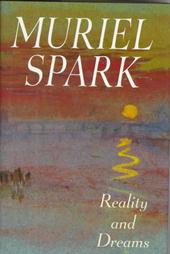I needed something light – literally – to read on a business trip to Korea and the mammoth, 600 page Muriel Spark biography I am half way through didn’t fit the bill or in my carry-on so I took one of Spark’s books that I haven’t read, Reality and Dreams her 20th novel. It’s short and sweet and characteristically bizarre. The most amazing thing about Muriel Spark is that she is able to conjure up all these weird, original stories and then tell them so sparingly – she never wastes a word. Also that she can be so withering, writing with nasty strokes and toying with your expectations, jerking you around like a fish on a line. The Driver’s Seat begins with the protagonist inexplicably murdered, while at the end of The Hothouse by the Eat River she reveals that all the protagonists had been dead since the opening page. Reality and Dreams begins ‘He often wondered if we were all characters in one of God’s dreams.” “He” is Tom, a successful 63 year old film director, an old fashioned auteur ala Steven Soderberg, who writes his own screenplays and still directs from cranes. He is injured from a fall from such a crane while directing a piece of indulgent, art-house eroticism called “The Hamburger Girl.” “The Hamburger Girl is “about” an unremarkable French girl he had glimpsed at a campsite, grilling hamburgers for customers on a portable grill, and for whose image he has developed an obsession.
The book begins with Tom recuperating from his fall at a posh, private clinic with a parodic procession of nurses, doctors tending to him. Far from a frail or sympathetic patient, Tom is egotistical, selfish, vain, philandering, condescending to the point of cruetly to his family. Stark revels in Tom’s swaggering cruetly, and when his daughter Marigold disappears and becomes the object of an international manhunt, I felt the same guilty relief as when that needy, knocked up girlfriend drowns in An American Tragedy. You don’t care if she’s dead because she is just so annoying. Tom and his otherwise outwardly decent and philanthropic – but weird, detached and self-deluded – wife Claire are baffled by how such attractive and erudite people like themselves could have spawned such an ugly, boorish daughter. When they watch Marigold’s documentary footage of her interviewing newly sacked men, her banal and plodding questions cause them to shriek with uncontrollable laughter. Marigold is not just unattractive, spiteful and rude, she is without ”magnificence,” in Aristotle’s sense and people like that are not tolerated by Spark. She paints Marigold as so boorish and hideous that she is easily mistaken for a homeless man. Spark has such flamboyant confidence in her writing that her over the top characters, be they malicious, repulsive, charming or gross don’t seem ridiculous. Nobody concocts a gross character quite like she does because she was mean (she once said about Virginia Woolf, “A spoilt brat. All right, she committed suicide, but she didn’t have to take the dog with her.”) Because satire is no longer a well-understood mode of writing (Gulliver’s Travels is infantillized as children’s adventure, Huckleberry Finn is “racist”), it’s easy to see her writing as brutal, and characters like Marigold or Lise victims of a vicious and omnipotent author’s brutalization. That she create these stupid but basically harmless girls and tortures them for her own amusement and for the amusement of her superior readers.
While in a coma following his accident, chaos erupted in Tom’s life. To his fury, the studio put another director on his movie, re named it something stupid, and had the plot altered for the worse. His family, lovers, friends, and colleagues are all caught up in sexual and economic turmoil. His daughter’s husbands are running away or being sacked at work. His real life and his creative/fantasy life become increasingly upset while he recuperates. In his semi comatose state, he instructs his attorney to change his will, bequeathing everything to the hamburger girl, fantasizing about killing his wife so that she can be really rich. All the while having zero empathy for anyone close to him, anyone actually “real”. A film director’s job, he knows, is safe from “redundancy”, and besides, his wife is filthy rich. All he can say about the spreading virus of redundancy in the work force, is ”Nobody fires a man if he is exceptionally good.” He tells his film crew “What we are doing is real and not real. We are living in a world where dreams are reality and reality is dreams. In our world everything starts from a dream”.
Michiko Kakutani, in his (negative) review of Ms. Spark’s novel “Reality and Dreams” in The New York Times in 1997, accurately described Muriel Spark’s approach as a recipe:
Take a self-enclosed community (of writers, schoolgirls, nuns, rich people, etc.) that is full of incestuous liaisons and fraternal intrigue; toss in a bombshell (like murder, suicide or betrayal) that will ricochet dangerously around this little world; and add some allusions to the supernatural to ground these melodramatics in an old-fashioned context of good and evil. Serve up with crisp, authoritative prose and present with ‘a light and heartless hand.
Reality and Dreams
Spark, Muriel
Publisher: Houghton Mifflin Company
Publication Date: 1997
Pages: 160 p.


